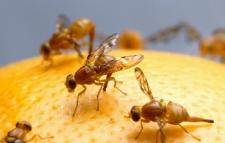This scientist is trying to stop a lab-created global disaster
By Kristen V. Brown,
Fusion
| 06. 27. 2016
When queried about the present state of biotechnology, Kevin Esvelt tends to sound more like a science skeptic than a pioneer of one of the most subversive genetic engineering technologies of all time.
“We are walking forwards blind,” Esvelt told me recently, chastising his field. “We are opening boxes without thinking about consequences. We are going to fall off the tightrope and lose the trust of public. Lots of people are going to die.”
Two years ago, Esvelt and his colleagues were the first to suggest that the gene-editing technology Crispr could be used to create what’s known as a gene drive, a formidable tool that can be used to override natural gene selection during reproduction to ensure that a desired trait is passed down throughout generations. Using gene drives, scientists could potentially alter the entire population of a species. It is a proposition that is at once both spectacular and terrifying.
Ever since putting the idea out there, Esvelt has been hard at work warning the world just how dangerous it might be. He worries that a lab...
Related Articles
By Arthur Lazarus, MedPage Today | 01.23.2026
A growing body of contemporary research and reporting exposes how old ideas can find new life when repurposed within modern systems of medicine, technology, and public policy. Over the last decade, several trends have converged:
- The rise of polygenic scoring...
By Stephanie Pappas, LiveScience | 01.15.2026
Genetic variants believed to cause blindness in nearly everyone who carries them actually lead to vision loss less than 30% of the time, new research finds.
The study challenges the concept of Mendelian diseases, or diseases and disorders attributed to...
By David Cox, Wired | 01.05.2026
As he addressed an audience of virologists from China, Australia, and Singapore at October’s Pandemic Research Alliance Symposium, Wei Zhao introduced an eye-catching idea.
The gene-editing technology Crispr is best known for delivering groundbreaking new therapies for rare diseases, tweaking...
By Josie Ensor, The Times | 12.09.2025
A fertility start-up that promises to screen embryos to give would-be parents their “best baby” has come under fire for a “misuse of science”.
Nucleus Genomics describes its mission as “IVF for genetic optimisation”, offering advanced embryo testing that allows...




